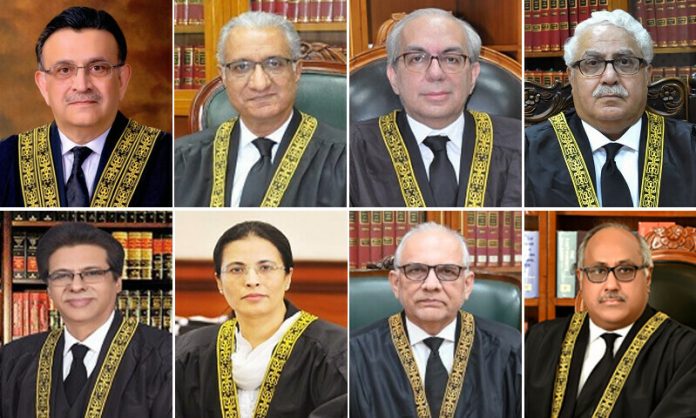There wont be any action on the bill even if the President signs it off, rules the Supreme Court
Special Correspondent
ISLAMABAD: In a major development, an eight-member larger bench of the Supreme Court (SC) on Thursday ordered that even if the Supreme Court (Practice and Procedure) Bill 2023 received the assent of the president, the bill would not be acted upon in any manner till further order.
The top court’s eight-member larger bench — headed by Chief Justice of Pakistan (CJP) Umar Ata Bandial and comprising Justice Ijaz ul Ahsan, Justice Munib Akhtar, Justice Sayyed Mazahar Ali Akbar Naqvi, Justice Muhammad Ali Mazhar, Justice Ayesha A Malik, Justice Syed Hasan Azhar Rizvi and Justice Shahid Waheed — issued its eight-page ruling on three petitions challenging the SC bill.
“The moment that the Bill receives the assent of the President or (as the case may be) it is deemed that such assent has been given, then from that very moment onwards and till further orders, the Act that comes into being shall not have, take or be given any effect nor be acted upon in any manner,” read the interim order.
The larger bench of the top court heard the petitions challenging the SC bill 2023 amidst a boycott of court proceedings by the country’s top lawyers body and criticism of the coalition government.
Pakistan Bar Council (PBC) Vice Chairman Haroonur Rashid and Executive Committee Vice Chairman Hassan Raza Pasha, said that the chief justice constituted the bench in haste for hearing the petitions.
They said that the lawyers’ community would boycott the court proceedings across the country on Thursday.
The bill is aimed at curbing the CJP’s suo moto powers in an individual capacity.
The SC bill was initially passed by the Senate amid PTI’s opposition on March 30 and sent to the president for his assent. The bill was moved in the Senate after it was approved by the National Assembly a day earlier.
The president, however, returned the SC bill for reconsideration to parliament as per the provisions of the Article 75 of the Constitution, stating that the bill prima-facie travels beyond the competence of the parliament and can be assailed as colourable legislation.
On April 9, the coalition government got the bill passed by a joint sitting of parliament.
Subsequently, three separate petitions were filed by Raja Amer Khan, Chaudhry Ghulam Hussain and Mohammad Shafay Munir, among others, under Article 184(3) of the Constitution, asking the top court to set aside the bill.
Today’s hearing
At the outset of the hearing, the petitioner’s lawyer Imtiaz Siddiqui started his arguments by saying that this case is very important in the prevailing situation.
The counsel said that differences widened between the parties in the wake of the Qasim Suri case and the political crisis increased after the National Assembly was restored.
“The federal government and the Election Commission of Pakistan (ECP) are not willing to hold elections which is why the court had to take suo motu notice,” said Siddiqui, while highlighting the circumstances in which the apex court intervened in the matter.
The lawyer said that the problems created following the court’s directives to implement the Constitution after which the judges and judiciary were criticised.
“The government’s ministers and members of parliament are responsible for this,” the lawyer said, adding that the proposed legislation interfered with the independence of the judiciary.

















